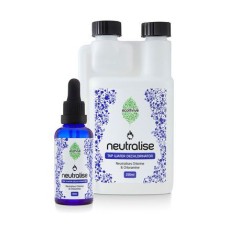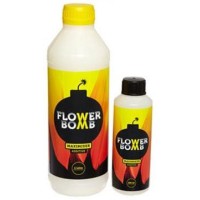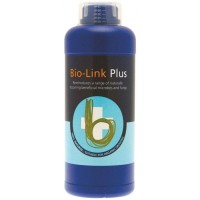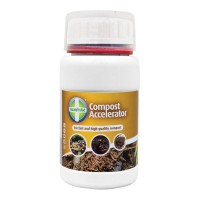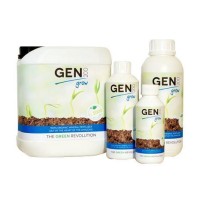Ecothrive Neutralise - Tap water dechlorinator by Ecothrive
Ecothrive Neutralise - Tap water dechlorinator by Ecothrive
Product Options
-
£8.95
In Stock
Neutralises Chlorine Instantly
Release the biological potential of your growing media and plant nutrients with Neutralise.
Neutralise instantly dechlorinates tap water, protecting beneficial microbes from the harmful effects of both chlorine and chloramine. It's ideal for conditioning tap water before adding microbial products such as Biosys. It can also be used with soil, coco and hydroponic systems as a pre-treatment for irrigation water and nutrient solutions.
- Treats Chlorine and Chloramine
- Ideal for organic gardeners
- Allows beneficial microbes to flourish
- Pre-treatment for hydroponic nutrient solutions
Neutralise has been formulated to actively target the presence of chlorine and chloramine in tap water. Chlorine is a powerful disinfectant added to water supplies all across the UK to kill potentially harmful bacteria. No doubt you will have smelt chlorine when running the tap or having a shower.
Chlorine alone in tap water can create some unwanted harmful by-products, so water companies also utilise a more stable version of chlorine known as chloramine. The procedure involves mixing ammonia into chlorinated water. Chloramine is far more persistent than chlorine alone, making it more effective at killing bacteria right to the point of drinking your glass of tap water, or watering your plants.
Stop Chlorine and Chloramine Killing Beneficial Biology!
Chlorine compounds are very reactive, killing microbes by oxidation. When present in the water as chlorine and chloramine they will readily oxidise enzymes, proteins, bacteria and other living microorganisms. Unfortunately they do not distinguish between “bad biology” and beneficials, so chlorine and chloramine can potentially knock back the microbiology in your growing media that your plants rely on.
The active ingredient in Neutralise is concentrated Vitamin C, a totally safe ingredient for your soil and plants. When Neutralise is added to chlorinated water, the Vitamin C is rapidly oxidised by the chlorine and chloramine. In this process the chlorine compounds are reduced to chloride, which is harmless to microbes. Chloride is also a micronutrient, required by plants at very low levels.
Don't hold your garden back by using chlorinated water, allow it to thrive with Neutralise.
Easy to Use
- Fill container
- Add one drop per litre
- Ready and safe for use
Frequently Asked Questions
Why should we be concerned about tap water chlorine for our gardens?
Watering growing media or soil with fresh tap water (or a tap water made nutrient solution) will kill some of the root zone microbes, mainly at the surface and within the top 1/3rd of the pot.
As the water is distributed over this area first, this is where most of the chlorine oxidising occurs and as is passes down through the pores and channels it will reduced into harmless low levels of chloride ions that the plants and microbes can use.
Chlorine compounds also antagonise root growth of some plants, studies have shown reduced root growth and plant health in hydroponic lettuce when chloramine is present at typical tap water levels.
Is tap water chlorine safe for use with microbial products?
No. Chlorine and chloramine will make beneficial microbial products much less effective. If making microbial teas such as Biosys, using untreated tap water is a bad idea as the chlorine in the water will antagonise the organisms attempting to be activated in the water.
If, like many organic or hydro gardeners, you are trying to culture beneficial microorganisms in your soil, coco or hydro system, it’s best to dechlorinate the water first to give them the best environment possible for growth to flourish.
How much chlorine do we have in our tap water?
In the UK the average amount of total chlorine is 0.5mg/l. This is a target that water companies try to keep, but can it go up to 1mg/l. The world health organisation set a health based guideline of 5mg/L for drinking water.
You can purchase a chlorine test kit or digital meter to give you a better idea. We have used and recommend the Hanna Handheld Colorimeters - HI-701 Free Chlorine and HI-711 Total Chlorine. If you have both, you can subtract the Free Chlorine result from the total chlorine result to let the know the combined/bound chlorine - which is predominantly the chloramine content.
We have tested the tap water at our offices in Sheffield on multiple occasions at different times of day. We have found the upper total chlorine to be 0.5mg/l, this is usually at peak water use times like early morning and late afternoon, and lower level to be 0.3mg/l. There seems to be a consistent amount of chloramine at 0.2mg/l, and a more variable amount of free chlorine depending on how quickly it's moving through the municipal water supply system.
How much total chlorine will neutralise treat?
Neutralise is formulated to deal with 0.6mg/l of total chlorine (free chlorine and chloramine) when used at 1ml per 20L, or if using the dropper bottle 1 drop per L.
Most tap water will have 0.5mg/L total chlorine or less, so Neutralise will deal with the majority of situations. If you have more that 0.6mg/L total chlorine then you can use a double dose, 2 drops or 1 ml per 10L.
How much is one drop from the 50ml Neutralise dropper bottle?
Each drop is consistently 0.05ml (50 microlitres)
How will Neutralise affect my water or nutrient solution?
Neutralise is ideal for treating water before adding microbial products or liquid nutrients, and is suitable for use with any other brand of nutrient or additive. Neutralise will not affect the final conductivity, but is mildly acidic and can reduce the pH of soft tap water by 0.1. If you have moderate or hard tap water you will not notice any effect on pH.
Is a chlorine water filter a better option?
Water filtration is another great way to reduce chlorine compounds. A good quality inline water filter containing granular activated carbon will deal with the majority of free chlorine from tap water, working in the same way as Ecothrive Neutralise; as reduction agent converting chlorine to chloride. Inline carbon filters do not adsorb chlorine or remove chloride. For complete removal you will need a Reverse Osmosis filter.
Most compact water chlorine filters do not deal with chloramine effectively, where chloramines are present you will need either four times as much carbon in the filter, a pre-filter containing KDF media and/or surface enhanced ‘catalytic carbon’.
More detailed info about activated carbon for water filtration can be found in this article.
Tags: ecothrive, Ecothrive, Neutralise, Tap, water, dechlorinator, chlorine, Chloramine, dechloramine
Q & A
Be the first to ask a question.

